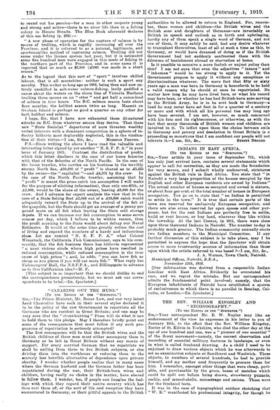INDIANS IN EAST AFRICA.
(To roe Burros or ens "Eiracrama.")
Sta,—Your article in your issue of September 7th, which has only just arrived here, contains several statements which appear to call for correction, as they are made the foundation for very severe, and I submit wholly undeserved, strictures against the British rule in East Africa. You state that "in Nairobi a very large proportion of the houses occupied by the English and other European reaidents are owned by Indiana" The actual number of houses so occupied and owned is sixteen, or about four per cent. of the total number of houses in European occupation. You go on to state that "no Indian is permitted to settle in the town." It Is true that certain parts of the town are reserved for exclusively European occupation, and there are also areas reserved for open spaces and other pur- poses; but for the rest Indiana are perfectly free to settle, build or rent houses, or buy land, wherever they like within the township. At the last Census, in 1011, there were close upon three thousand Indians In Nairobi. The number to-day is probably much greater. The Indian community annually elects two Indian members to the Municipal Committee. If any further discussion of this subject is to take place, may I be permitted to express the hope that the Spectator will obtain access to more trustworthy sources of information than those upon which the article referred to was based P—I am, Sir, Ac., J. A. WASSON, Town Clerk, Nairobi.
Municipal Offices, Nairobi, B.E.A.,
November 13th, 1918.
[Our information was derived from a reeponsible Indian familiar with East Africa. Evidently he overstated hie case, and we regret the mistake. But our correspondent admits the fundamental point involved; namely, that the European inhabitants of Nairobi have established a system of exclusiveness to which there is no parallel in Bombay, Cal- cutta, or London.—ED. Spectator.]


































 Previous page
Previous page